Do you need clarification about the difference between a trailer hitch and a receiver?
Don’t worry; you’re not alone. A lot of people need to learn the difference.
This blog post will clear up any confusion and explain the difference between a trailer hitch and a receiver.
So, what is the difference? Keep reading to find out!
What is the difference between a trailer hitch and a receiver?
The main difference between a trailer hitch and a receiver is that a trailer hitch is permanently affixed to the vehicle, while a receiver can be removed when not in use.
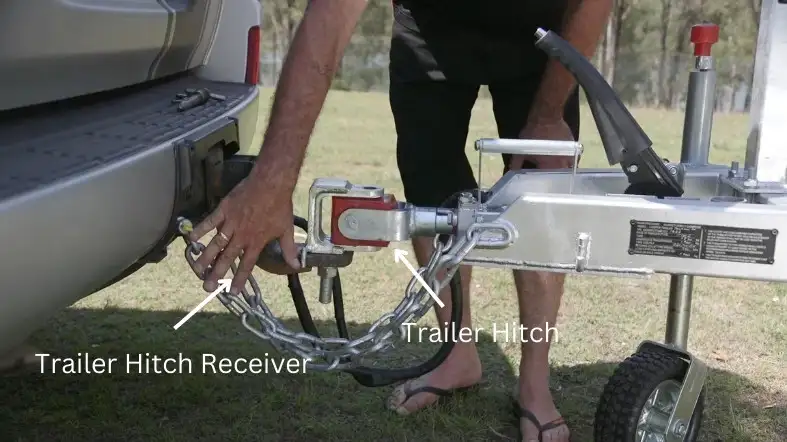
If you have a trailer hitch, you must purchase a receiver separately.
Then, the receiver is inserted into the trailer hitch and held with a pin.
The receiver acts as an attachment point for your trailer’s ball mount.
The ball mount holds the trailer’s coupler, which attaches to the trailer.
A trailer hitch also needed a weight distribution system to keep the trailer level and distribute its weight correctly.
There is a table given below about the difference between both.
| Feature | Trailer Hitch | Receiver |
|---|---|---|
| Towing Capacity | Typically limited to 2k-3.5k lbs | Can handle up to 10k lbs or more |
| Compatibility | Specific to certain vehicles | More versatile, adaptable to many vehicles |
| Design | Welded onto the vehicle frame | Inserts into receiver tube on the vehicle frame |
| Customization | Limited options | Can be paired with different accessories for versatility |
| Price | More affordable | More expensive but worth it for frequent towing needs |
What are the merits and demerits of each type?
There are some critical distinctions between receiver hitches and trailer hitches.
If you think about doing a lot of towing and need maximum capacity, then a receiver hitch is the way to go.
However, a trailer hitch may be the better option if you don’t often tow and want an easier installation.
Trailer Hitch:
Permanently affixed to the vehicle
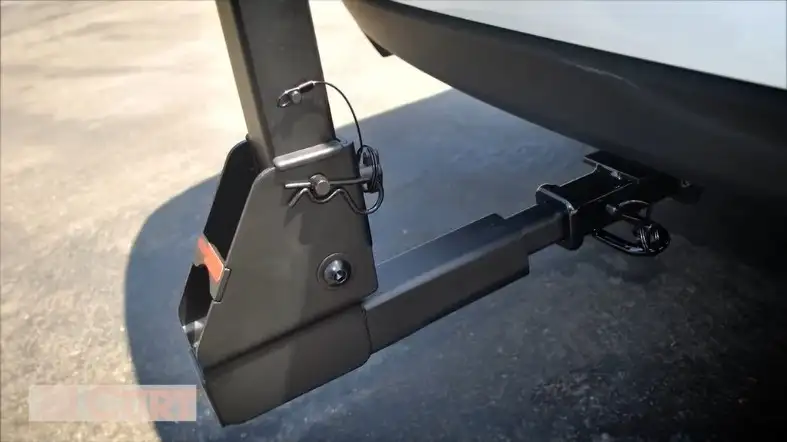
It is only possible to remove a trailer hitch by damaging the vehicle.
If you’re planning on using your trailer hitch sparingly, or if you want to be able to remove it easily for aesthetic reasons, there are better options than a trailer hitch.
More difficult to install
A trailer hitch must be welded or bolted onto your vehicle’s frame.
This can be difficult, and time-consuming, especially if you need to gain experience with this sort of thing.
Can add weight and affect gas mileage
A trailer hitch will add some weight to your vehicle, impacting its gas mileage.
Additionally, the extra weight can stress your vehicle’s suspension and brakes.
May be more expensive
Depending on the manufactures and model of your vehicle, a trailer hitch may be more expensive than a receiver hitch.
Receiver Hitch:
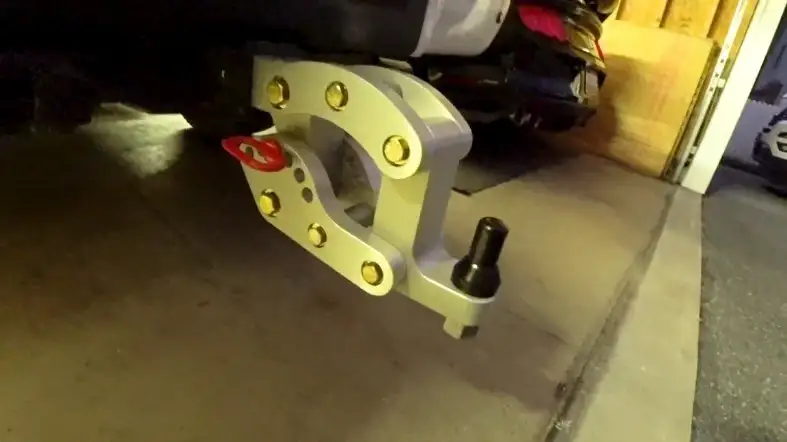
Easier to install
A receiver hitch can be installed with just a few bolts, making it much easier than a trailer hitch.
More versatile
A receiver hitch allows you to remove it when you’re not using it, saving on gas mileage and reducing wear and tear on your vehicle.
Additionally, a receiver hitch can be used with various attachments, so you can use it for more than just towing a trailer.
Can be less expensive
It also depends on the design and model of your vehicle, a receiver hitch may be less expensive than a trailer hitch.
What Are Some Different Types Of Trailer Hitches And Receivers?
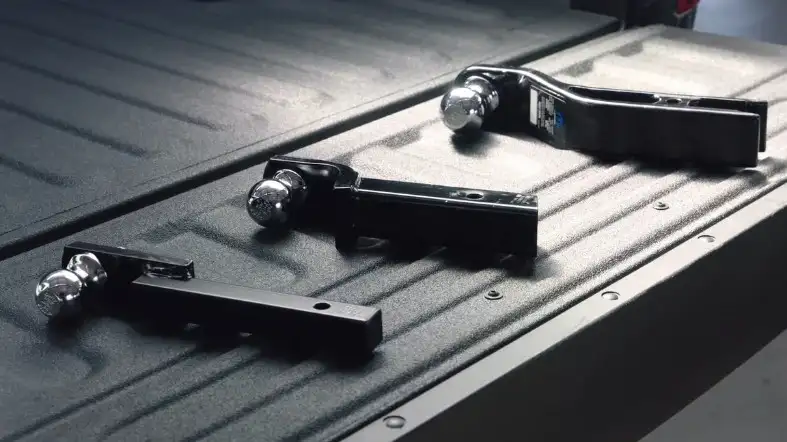
There are different trailer hitches and receivers, but the two most common are ball mounts and adjustable couplers.
Also, the others are given below,
Trailer Hitches:
Class I:
Lowest weight capacity, typically used for smaller trailers such as pop-up campers.
They are the easiest to install. Its weight limit is 2,000 pounds.
Class II:
Higher weight capacity than Class I, typically used for mid-sized trailers such as boat trailers.
Also, it has a weight capacity of 3,500 pounds and can tow trailers that weigh up to 7,000 pounds.
Class III:
The highest weight capacity is typically used for larger trailers such as RVs.
Its maximum weight capacity is usually between 6,000 and 8,000 pounds.
Receivers:
Standard:
The most common type of receiver can be used with various hitch-mounted accessories.
Also called a hitch mount, it typically bolts onto your vehicle’s frame.
If you don’t have a trailer hitch receiver, you can have one installed by a professional.
Weight-bearing
Also called a drawbar, this type of receiver is designed to bear the weight of your trailer tongue.
It’s permanently attached to the vehicle and can’t be removed when not in use.
Hidden
A remote receiver is mounted underneath your vehicle, out of sight.
This type uses low-profile hitch-mounted accessories such as bike racks and cargo carriers.
Heavy Duty
Designed for use with heavier trailers and more demanding applications.
It is permanently affixed to the vehicle, so it can’t be removed when not in use.
Fifth Wheel:
They are used specifically for fifth-wheel trailers (large, heavy trailers attached to a pickup truck’s bed).
There is a table attached below to show the sizes of receivers according to their capacity.
| Receiver’s capacity | Sizes |
|---|---|
| Lowest weight | 1 1/4″ |
| Higher weight | 2″ |
| Highest weight | 2 5/16″ |
What Are Some Things To Remember When Choosing A Trailer Hitch Or Receiver?
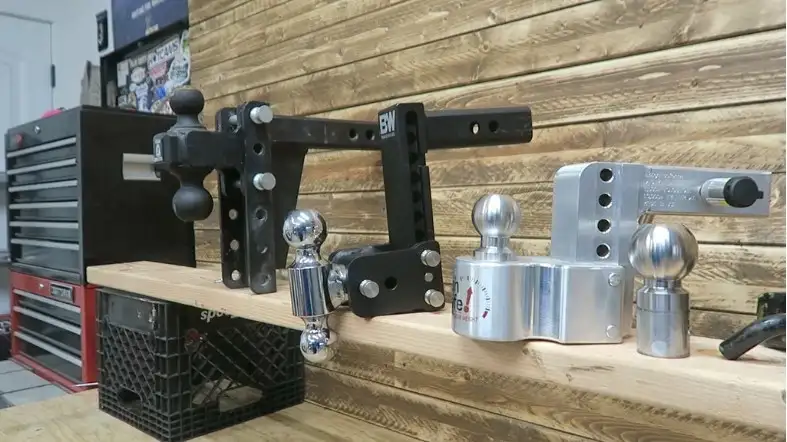
When choosing a trailer hitch or receiver, some things to keep in mind include the trailer’s weight, the trailer’s size, the trailer, the type of trailer, and the vehicle the hitch or receiver will be installed on.
The weight of the trailer
Knowing the trailer’s weight is essential to choosing the right hitch or receiver.
A heavier trailer will require a stronger hitch or receiver.
Hitches are typically weight-bearing, while receivers are not.
This means that hitches can handle more weight than receivers.
The size of the trailer
The towing capacity of the vehicle determines the sizes of hitches.
In general, the larger the vehicle, the higher the towing capacity and the higher the class of hitch that is required.
For example, a class 3 hitch is designed for vehicles with a towing capacity of up to 6000 pounds, while a class 5 hitch can tow up to 10,000 pounds.
Receivers, on the other hand, are not weight-bearing.
This means they are not made to support the weight of a trailer.
Instead, receivers attach accessories to the vehicle, such as bike racks or cargo carriers.
Because they are not weight-bearing, receivers are typically much easier to install than hitches.
The type of trailer
There are two types of trailers-the ones with brakes and the ones without.
The hitches for these trailers are different; the hitch for a trailer with brakes will have a weight-bearing capability, while the hitch for a trailer without brakes will not.
The customer’s budget
The prices for each of these will depend on the vehicle’s model and the specific hitch or receiver. In general, though, hitches tend to be more expensive than receivers.
The installation process
Hitches are typically more challenging to install than receivers.
This is because they need to be permanently affixed to the vehicle, while receivers can be removed when not in use.
Versatility
Receivers are more versatile than hitches because they can be used with various accessories.
Hitches, on the other hand, are designed specifically for use with trailers.
What Can Different Accessories Be Used With Trailer Hitches And Receivers?
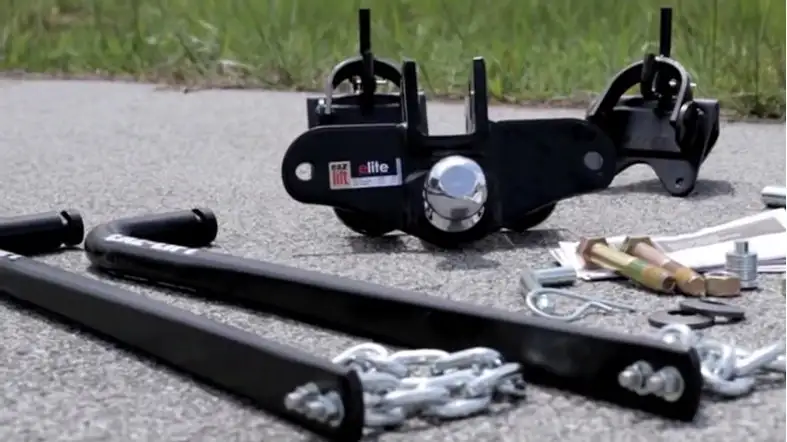
The tools and accessories used with trailer hitches and receivers vary depending on the application.
For example, some everyday items used with trailer hitches include: weight-distributing hitches, sway control devices, brake controllers, and hitch balls.
Other standard receiver accessories include winches, ball mounts, hitch-mounted cargo carriers, and bike racks.
Hitch Balls: Used to connect the trailer to the hitch or receiver
Hitch Covers: Used to cover the hitch or receiver when not in use
Hitch Locks: Used to secure the hitch or receiver to the vehicle
Ball Mounts: Used to raise or lower the trailer tongue for level towing
Weight Distribution Systems: Used to distribute the weight of the trailer tongue evenly over the axle(s) of the tow vehicle
What tips for properly using and caring for a trailer hitch or receiver?
There are some vital things to keep in mind when using and caring for your trailer hitch or receiver:
- Inspect the hitch or receiver before each use to ensure that it is secure and free of damage
- Do not exceed the weight capacity of the hitch or receiver
- Always use proper safety chains when connecting a trailer to a hitch or receiver
- Regularly inspect the hitch or receiver for wear and tear
- Make sure the hitch or receiver is appropriately secured to the vehicle before each use
- Follow the manufacturer’s instructions for the proper use and care
- Do not use damaged or defective hitch or receiver parts
FAQs about the difference between a trailer hitch and a receiver
What Is The Difference Between A Trailer Hitch And A Receiver?
A trailer hitch is permanently affixed to the vehicle, while a receiver can be removed when not in use.
A trailer hitch is also more challenging to install and typically more expensive than a receiver.
What Common Problems Can Occur With Trailer Hitches And Receivers?
Some common problems that can occur with trailer hitches and receivers include wear and tear, rust or corrosion, improper installation or use of hitch or receiver parts, and exceeding the weight capacity of the hitch or receiver.
What Tips For Troubleshooting Common Problems With Trailer Hitches And Receivers?
Some tips for troubleshooting common problems with trailer hitches and receivers include checking the hitch or receiver for wear and tear, inspecting the hitch or receiver for rust or corrosion, making sure all hitch or receiver parts are correctly installed and tightened, checking that the vehicle and trailer are within the weight capacity of the hitch or receiver, and replacing damaged or defective hitch or receiver parts as needed.
Where Can I Go For More Help?
If you are having trouble with your trailer hitch or receiver, the best thing to do is consult with the manufacturer directly.
You can also bring your vehicle and trailer to a qualified mechanic or trailer service center for assistance.
The Final Thoughts
What is the difference between a trailer hitch and a receiver?
Sure, you get the answer from this article, but the general idea is that a trailer hitch is permanently affixed to the vehicle, while a receiver can be removed when not in use.
A trailer hitch is also more challenging to install and typically more expensive than a receiver.
Be aware of your next towing job!
Be sure you have the proper equipment for the task at hand. And, as always, be safe out there!
